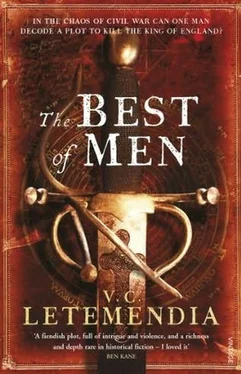Claire Letemendia - The Best of Men
Здесь есть возможность читать онлайн «Claire Letemendia - The Best of Men» весь текст электронной книги совершенно бесплатно (целиком полную версию без сокращений). В некоторых случаях можно слушать аудио, скачать через торрент в формате fb2 и присутствует краткое содержание. Год выпуска: 2009, ISBN: 2009, Издательство: McClelland & Stewart, Жанр: Исторические приключения, на английском языке. Описание произведения, (предисловие) а так же отзывы посетителей доступны на портале библиотеки ЛибКат.
- Название:The Best of Men
- Автор:
- Издательство:McClelland & Stewart
- Жанр:
- Год:2009
- ISBN:978-0-7710-5274-3
- Рейтинг книги:5 / 5. Голосов: 1
-
Избранное:Добавить в избранное
- Отзывы:
-
Ваша оценка:
- 100
- 1
- 2
- 3
- 4
- 5
The Best of Men: краткое содержание, описание и аннотация
Предлагаем к чтению аннотацию, описание, краткое содержание или предисловие (зависит от того, что написал сам автор книги «The Best of Men»). Если вы не нашли необходимую информацию о книге — напишите в комментариях, мы постараемся отыскать её.
The Best of Men — читать онлайн бесплатно полную книгу (весь текст) целиком
Ниже представлен текст книги, разбитый по страницам. Система сохранения места последней прочитанной страницы, позволяет с удобством читать онлайн бесплатно книгу «The Best of Men», без необходимости каждый раз заново искать на чём Вы остановились. Поставьте закладку, и сможете в любой момент перейти на страницу, на которой закончили чтение.
Интервал:
Закладка:
Radcliff recollected Ingram talking about the friend, whom he had known since he was up at university. Heir to a wealthy lord, Beaumont was apparently a heavy drinker with an eye for women. In all likelihood some insolent, red-faced nobleman, Radcliff thought; just the type he had always envied bitterly for the ease with which they could pay for their vices and escape moral disapprobation, quite apart from punishment under the law. To enjoy their freedom and exalted rank in society he must see his plans come to fruition and meanwhile put up with his lowly status as a country squire, owner of a few boggy acres near Cambridge that he could not even afford to drain and make productive, and that he was half ashamed to show to his future bride. He would have to put up with Ingram’s friend, too: Ingram had insisted they be introduced, and was even hoping that the fellow might join their troop.
Radcliff turned onto his side, trying to avoid the worst lumps in the mattress. It was true, he acknowledged, that he was in need of experienced recruits who had the money to equip themselves. Nevertheless, he disliked the possibility that this friend, with all the privileges of birth and a longer history with Ingram, might supplant him in Ingram’s affections. He had grown more and more fond of Ingram, and not only because they were soon to be related by marriage; he appreciated Ingram’s warm, open nature and valued his admiration.
What a peculiar coincidence that the man should be called Beaumont, though of course the name was not uncommon. Radcliff had heard of a John Beaumont enlisted in the King’s army, and then there was the famous playwright, Francis Beaumont, so popular with the Royal Court. In France, it was not an unusual name at all. But it dredged up the nagging worry that had plagued him ever since his fateful night in The Hague.
Scratching at his chest where he sensed the tickle of fleas, he thought how very unfair it was that such a trivial error, a last bachelorhood indulgence in an expensive Dutch house of pleasure, had drawn such trouble upon him. If only, he had mused countless times; if only he had left his servant to guard his possessions; if only he had not drawn the curtain when he took the whore to bed. He might have seen that other woman creep into the chamber and with quick, adroit fingers steal his purse, snatch his sword, and slip out as silently as she had entered. Lying afterwards to his great patron, the Earl of Pembroke, had filled Radcliff with dread. He had admitted that the thief had taken the beautiful Toledo sword that Pembroke had given him, and all the money that he had been carrying to buy arms for the earl’s personal security. But he could not reveal that she had also made off with something yet more valuable to him, though she would never have known it: the coded correspondence between him and Pembroke, which he had preserved in case their association turned to enmity or some unanticipated event frustrated their plans. If Pembroke ever found out, Radcliff would not be long for this world.
Yet it seemed impossible. The thief was thousands of miles away. As Radcliff knew from the brothel-keeper’s grooms, she was an ignorant gypsy paired up with a cardsharp, Monsieur Beaumont , as he had been called at the house, so no doubt a Frenchman, perhaps illiterate too. And even had they discovered the letters tucked inside the lining of Radcliff’s purse, they would have been unable to make head or tail of the code.
No, surely he was safe, Radcliff comforted himself, as safe as was his reputation with Pembroke, who believed in and depended upon his arcane knowledge and skills to negotiate the complex twists and turns of the road ahead. For in the coming war, he and Pembroke would appear to be on opposite sides, Pembroke on Parliament’s and Radcliff on the King’s, while all along working towards a change of rule that would appall His Majesty’s most virulent opponents. The boldness, the vaunting ambition of it, still dazzled Radcliff, but it was written in the stars, as he had foreseen.
Again he reflected on the irony that although he could draw up the horoscopes of other men and women, he could not chart his own: his birth had been a lengthy and difficult process costing his mother her life, and no record had been kept of when exactly he had emerged. Pembroke, however, was a different case: his eminent family had set down all the essential details of time and place. And he, as Radcliff had already assured him, would live through the war to a prosperous dotage, so there seemed no reason to believe that he could fail in his political aims.
Hearing the college bells chime two of the clock, Radcliff began to dwell, more happily, upon Kate. Without her knowledge, he had also cast her horoscope, so that he could at least catch a glimpse of his future from hers. Their union would be fruitful, he had discovered, and her life, like Pembroke’s, would last into old age.
He had not cared for any woman as much before. He remembered proposing to her last year at Richard Ingram’s house in Newbury, and how, when she accepted, her blue eyes had returned his gaze without coquetry or shyness.
“I must go abroad again, Kate, to arrange to free myself from my commission with the Dutch,” he had said, expecting some feminine anxiety on his behalf. She had merely nodded and allowed him to kiss her cheek: their first kiss.
Back in England after the theft, still smarting from Pembroke’s angry disappointment, Radcliff had gone to see her again. He had kissed her once more, on the lips, and she had been equally undemonstrative. “She’s an odd girl, always was,” Ingram had told him. “The ice queen, we used to call her. Doesn’t even gossip with Richard’s wife.”
“I like that,” Radcliff had said, confident of winning her affection slowly and patiently, in the same way that he hoped to lay the foundations for his own success. She was superior to other women, pure and self-contained, in every way fitted for the honours that he wished to confer upon her. And it was her very iciness that made him yearn to stir her to passion, as soon as they were wed.
III
Ingram’s older brother, Richard, begrudgingly allowed Laurence to stay the night, on two strict conditions: that he share his unconscious friend’s chamber, to keep an eye on him, and leave at once the next day. Laurence agreed. He was himself drunker than he had thought, and ready to sleep.
Yawning as he took off his doublet, he touched the scar at his right side, a deep trough in the flesh that ached occasionally in damp weather. He could still remember the impact, the intense shock rather than pain, of being shot, and then the stupid sense of injustice, as if his luck should have held indefinitely.
It happened by the banks of the Rhine during a brief skirmish with the enemy. The musket ball came from nowhere, shattering the edge of Laurence’s light breastplate, almost blasting him from his saddle. He clung to the reins with one hand but would have fallen and been trampled instantly had someone not pulled him out of the fray. Eventually he was thrown with a pile of other groaning men into a cart, the bouncing of which, as it bore him over the torn and broken earth, sent him into oblivion.
At a nearby village some barns and stables, now emptied of livestock and fodder, had been commandeered as a makeshift hospital for the wounded French and German troops. After regaining consciousness, he waited there, on a floor puddled with blood and human waste, beside a man already dead, until a surgeon could be found to extract the ball. His breastplate had slowed its pace, preventing it from passing cleanly through him and leaving small pieces of metal embedded so deep that they could only be removed by repeated incisions. By the time the surgeon had finished, Laurence was hoarse from screaming. The surgeon stuffed ash into his wound to staunch the bleeding; then he was bandaged inadequately with the remnants of his shirt, fed a cup of sour wine, and abandoned to the clouds of flies.
Читать дальшеИнтервал:
Закладка:
Похожие книги на «The Best of Men»
Представляем Вашему вниманию похожие книги на «The Best of Men» списком для выбора. Мы отобрали схожую по названию и смыслу литературу в надежде предоставить читателям больше вариантов отыскать новые, интересные, ещё непрочитанные произведения.
Обсуждение, отзывы о книге «The Best of Men» и просто собственные мнения читателей. Оставьте ваши комментарии, напишите, что Вы думаете о произведении, его смысле или главных героях. Укажите что конкретно понравилось, а что нет, и почему Вы так считаете.












